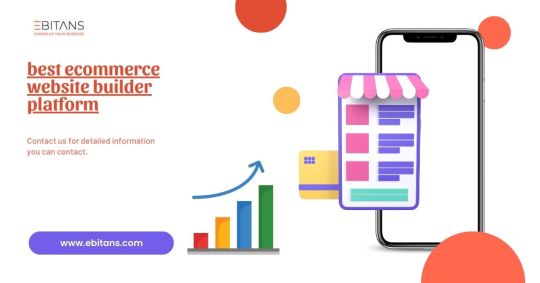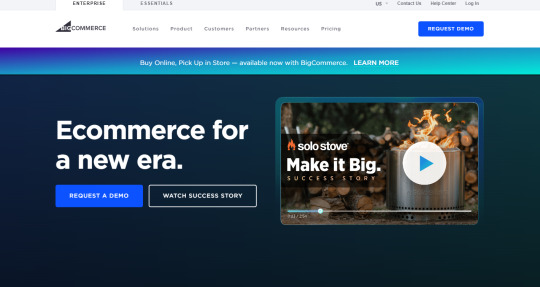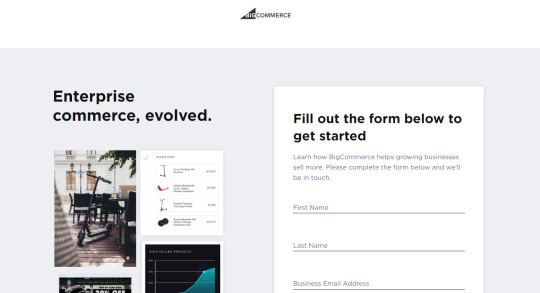#bigcommerce marketing
Explore tagged Tumblr posts
Text
Template Designing Company in New York
Best Template Designing Company in New York Are you looking for a reliable and creative template designing services in New York? If extremely you have come to the right place! A well-Layout template plays a decisive role in constructing a strong online presence. Whether you take templates for websites emails presentations or whatever digital happy amp professionally crafted plan Improves…

View On WordPress
#ai#bigcommerce design development#bigcommerce development#bigcommerce development company.#bigcommerce development in india#bigcommerce development in us#bigcommerce development services#bigcommerce web development#business#digital-marketing#marketing#technology
0 notes
Text
Elevate Your Online Presence with Our BigCommerce SEO Agency
In the competitive world of e-commerce, standing out requires more than just great products—it demands exceptional visibility. Our Bigcommerce SEO Agency specializes in optimizing your BigCommerce store to enhance its search engine rankings and drive organic traffic. With a tailored strategy that includes keyword research, on-page optimization, technical SEO, and content creation, we ensure your store reaches its full potential.
We understand the unique challenges of BigCommerce platforms and leverage the latest SEO techniques to improve your site's structure, load speed, and user experience. Our team is dedicated to keeping your store ahead of competitors by focusing on both local and global search opportunities.
Partner with us to experience a significant boost in search engine rankings, increased traffic, and higher conversion rates. Let our expertise guide you towards achieving your e-commerce goals and growing your business with precision. Reach out today to see how our BigCommerce SEO services can transform your online presence!
0 notes
Text
Streamlining Tax Compliance: Using Quaderno to Automate Taxes for Businesses Shipping into the EU.
Quaderno is a powerful tool designed to simplify the process of managing taxes for online businesses. It automates the calculation, collection, and reporting of sales tax, VAT, and GST, helping businesses stay compliant with tax regulations around the world. Introduction: Automating taxes for businesses shipping into the EU can be a game-changer in streamlining operations and ensuring…
View On WordPress
#accounting#and GST#Automate Taxes#automated-eu-vat-calculator#automated-vat-tools#Automating taxes for EU shipments#automating-taxes-for-businesses-shipping-into-the-eu#avoiding EU penalties#Benefits of Automating Tax Compliance#bigcommerce#compliance-risks#DUTIES#DUTIES AND TAXES#e#e-commerce platforms#ecommerce#EU#EU market#EU Shipping#eu-vat-tools#European Union#finance#INTERNATIONAL#IOSS#online-shopping#payment gateways#Quaderno#real-time-insights#sales tax#shipping
0 notes
Text
How Can You Use BigCommerce Development Services to Grow Your Store?

In today's digital landscape, establishing a strong online presence is crucial for the success of e-commerce businesses. BigCommerce, a leading e-commerce platform, offers a robust framework for creating and managing online stores. Leveraging BigCommerce development services can significantly enhance the growth potential of your store, providing scalability, customization, and innovative features. In this article, we delve into how businesses can utilize big commerce development services to drive growth, with a focus on the expertise and solutions offered by Xettle Technologies.
Scalability and Flexibility:
One of the key advantages of BigCommerce development services is scalability. As your business grows, you need a platform that can accommodate increased traffic, transactions, and product offerings. Xettle Technologies specializes in developing scalable BigCommerce solutions tailored to your specific requirements. Whether you're a startup looking to expand or an established enterprise seeking to optimize operations, Xettle ensures that your store can seamlessly scale to meet evolving demands, without compromising performance or user experience.
Customization and Personalization:
Personalization is paramount in today's competitive e-commerce landscape. BigCommerce development services offer extensive customization options, allowing businesses to create unique and branded storefronts that resonate with their target audience. Xettle Technologies excels in crafting custom BigCommerce themes, plugins, and extensions that align with your brand identity and cater to the preferences of your customers. By leveraging Xettle's expertise in customization, you can differentiate your store, enhance user engagement, and drive conversions.
Optimized User Experience:
A seamless and intuitive user experience is essential for driving engagement and retention in e-commerce. BigCommerce development services enable businesses to optimize their store's user interface, navigation, and checkout process for maximum convenience and satisfaction. Xettle Technologies specializes in UX/UI design for BigCommerce, ensuring that your store is user-friendly, responsive, and aesthetically appealing across devices and platforms. By prioritizing user experience, Xettle helps businesses create frictionless shopping experiences that encourage repeat purchases and foster customer loyalty.
Integration and Expansion:
Integration with third-party tools and services is crucial for extending the functionality and reach of your BigCommerce store. Xettle Technologies offers seamless integration services, enabling businesses to connect their store with payment gateways, shipping providers, marketing platforms, and more. Whether you're looking to integrate with CRM systems, inventory management tools, or analytics platforms, Xettle ensures smooth interoperability and data synchronization, empowering businesses to streamline operations and expand their capabilities.
Data-driven Insights and Optimization:
In the competitive e-commerce landscape, data-driven decision-making is essential for driving growth and profitability. BigCommerce development services provide access to advanced analytics and reporting features that enable businesses to gain valuable insights into customer behavior, sales trends, and performance metrics. Xettle Technologies specializes in implementing analytics solutions for BigCommerce, helping businesses track key metrics, identify opportunities for optimization, and make informed decisions to drive store growth.
Security and Compliance:
Ensuring the security and compliance of your e-commerce store is paramount for building trust and protecting sensitive customer information. BigCommerce development services prioritize security measures such as PCI compliance, SSL encryption, and fraud detection capabilities. Xettle Technologies implements robust security protocols and best practices to safeguard your store against cyber threats and data breaches, providing peace of mind for both businesses and customers.
Conclusion:
Utilizing BigCommerce development services is essential for unlocking the full potential of your e-commerce store and driving sustainable growth. With Xettle Technologies as your trusted partner, you can leverage the expertise and solutions needed to maximize the performance, scalability, and profitability of your BigCommerce store. Whether you're a startup looking to establish a strong online presence or an established enterprise seeking to optimize operations, Xettle Technologies offers tailored BigCommerce development services to help you achieve your business objectives and thrive in the competitive e-commerce landscape.
1 note
·
View note
Text
Website Or App? Solution – Ecommerce Storefront [Video]
#BigCommerce#OnlineBusiness#DigitalMarketing#DigitalMarketingTips#Big Commerce#Online Business#Digital Marketing#Digital Marketing Tips
0 notes
Text
Discover the step-by-step process of building a profitable dropshipping business. Learn niche selection, supplier research, store setup, and more.
#dropshipping#ecommerce#onlinestore#entrepreneurship#business#marketing#digitalmarketing#socialmedia#onlineselling#onlineretail#shopify#woocommerce#bigcommerce#aliexpress#oberlo#productresearch#customerservice#inventorymanagement#financialfreedom#passiveincome#workfromhome
1 note
·
View note
Text
10 Steps to Launch Your Dream Business Online Successfully

In today’s digital era, businesses thrive online as more consumers prefer shopping and engaging with brands virtually. To succeed in this competitive space, you must establish a strong online presence and build a brand that stands out. If you’re ready to start your dream business online, this guide will walk you through the essential 10 steps to launch successfully.
Step 1: Define Your Business Idea
Start by clearly defining your business concept. Identify your target audience, the products or services you will offer, and what makes your brand unique. Your unique value proposition (UVP) should set your business apart and address a specific customer need or pain point.
Step 2: Conduct Market Research
Research your industry, competitors, and customer preferences. Understanding market demand will help you tailor your offerings. Analyze competitors’ strengths and weaknesses to identify gaps in the market that your business can fill. Engage with similar businesses to gain insights and advice.
Step 3: Create a Business Plan
A well-structured business plan outlines your goals, marketing strategies, financial projections, and operational structure. This roadmap guides you through launching and scaling your business. If you seek funding, investors will require a solid business plan detailing startup costs, revenue forecasts, and growth strategies.
Step 4: Choose a Memorable Domain Name
Your domain name should align with your brand, be easy to remember, and represent your business niche. Ensure it is available and register it with a trusted domain provider. A strong domain reinforces brand identity and improves searchability.
Step 5: Build a Professional Website
A user-friendly, visually appealing website is essential for credibility. Platforms like WordPress, Shopify, or Squarespace offer easy-to-use website builders. If budget allows, consider hiring a web designer to create a custom site that reflects your brand’s professionalism.
Step 6: Develop a Strong Online Presence
Implement SEO strategies, content marketing, and social media engagement to grow your visibility. Utilize platforms like Instagram, LinkedIn, and Facebook to connect with potential customers. Create valuable content to attract and retain visitors.
Step 7: Set Up E-Commerce Capabilities
If selling products or services, integrate a secure e-commerce platform. Ensure a smooth checkout experience, reliable payment gateways, and efficient order processing. Platforms like Shopify, WooCommerce, or BigCommerce offer robust e-commerce features.
Step 8: Establish a Brand Identity
Your brand identity includes a logo, color scheme, and consistent design elements across all platforms. A cohesive brand image builds trust and recognition. Apply branding across your website, marketing materials, and social media.
Step 9: Build a Customer Base
Engage with potential customers through email marketing, loyalty programs, and referral incentives. Provide exceptional customer service to build long-term relationships. Word-of-mouth marketing can be a powerful tool in expanding your audience.
Step 10: Monitor, Evaluate, and Adapt
Use analytics tools to track performance. Regularly review customer feedback, sales trends, and engagement metrics to make data-driven improvements. Adapt your strategies to enhance customer experience and business growth.
By following these steps, you can successfully launch and grow a thriving online business that stands out in the digital marketplace.
2 notes
·
View notes
Text

Starting an e-commerce business can be an exciting venture with immense potential. However, with the opportunities come challenges and uncertainties. Before diving into the world of online retail, it’s crucial to plan carefully and set a solid foundation. Here are some essential tips to consider before launching your e-commerce business:
1. Conduct Market Research
Understanding the market is fundamental to any successful business. Start by identifying your target audience and analyzing competitors. Research trends, customer preferences, and potential gaps in the market. Tools like Google Trends, social media analytics, and industry reports can provide valuable insights. This research will help you tailor your products or services to meet market demands and differentiate yourself from competitors.
2. Define Your Business Model
E-commerce offers various business models, such as B2C (Business to Consumer), B2B (Business to Business), C2C (Consumer to Consumer), and subscription-based models. Determine which model aligns with your goals and resources. Each model has its own set of challenges and requirements, so choose one that best fits your product or service and target market.
3. Create a Solid Business Plan
A comprehensive business plan serves as a roadmap for your e-commerce venture. Outline your business goals, strategies, target audience, marketing plan, financial projections, and operational plan. This document will not only guide your efforts but also help secure funding if needed. A clear plan can keep you focused and organized as you navigate the complexities of launching and running an e-commerce business.
4. Choose the Right E-Commerce Platform
Selecting the right e-commerce platform is crucial for the success of your online store. Popular platforms like Shopify, WooCommerce, Magento, and BigCommerce each offer unique features and capabilities. Consider factors such as ease of use, scalability, customization options, payment gateways, and integration with other tools. The platform should align with your business needs and provide a user-friendly experience for both you and your customers.
5. Develop a User-Friendly Website
Your website is the face of your e-commerce business. Ensure it’s designed to be user-friendly, visually appealing, and optimized for mobile devices. A clean, intuitive layout with easy navigation will enhance the shopping experience and reduce cart abandonment rates. Focus on high-quality images, detailed product descriptions, and a seamless checkout process. Additionally, implement search engine optimization (SEO) strategies to improve your site’s visibility in search engines.
6. Implement Secure Payment Processing
Security is a top priority in e-commerce. Customers need to trust that their payment information is safe. Choose a reputable payment gateway and ensure your website uses SSL certificates to encrypt data. Additionally, offer multiple payment options, including credit/debit cards, digital wallets, and other payment methods that are popular with your target audience.
7. Plan Your Logistics and Supply Chain
Efficient logistics and supply chain management are vital for e-commerce success. Develop a strategy for inventory management, warehousing, and shipping. Decide whether you’ll handle fulfillment in-house or partner with third-party logistics providers. Consider shipping options, delivery times, and costs. A smooth and reliable fulfillment process can significantly impact customer satisfaction and repeat business.
8. Craft a Marketing Strategy
Effective marketing is essential to drive traffic and sales to your e-commerce store. Develop a multi-channel marketing strategy that includes social media, email marketing, content marketing, and paid advertising. Create engaging content, run promotions, and leverage social media platforms to build brand awareness and attract customers. Monitor and analyze the performance of your marketing efforts to refine your strategies over time.
9. Focus on Customer Service
Exceptional customer service can set your e-commerce business apart from competitors. Provide multiple channels for customer support, such as live chat, email, and phone. Ensure timely responses to inquiries and resolve issues promptly. Building strong customer relationships and encouraging feedback can enhance customer loyalty and drive positive reviews.
10. Monitor and Adapt
The e-commerce landscape is constantly evolving. Regularly review your business performance, track key metrics, and gather customer feedback. Stay informed about industry trends and technological advancements. Be prepared to adapt your strategies and operations based on insights and changes in the market.
#ecommerce#marketing#business#digitalmarketing#ecommercebusiness#entrepreneur#onlineshopping#website#seo#webdesign#b#marketingdigital#onlinebusiness#branding#shopify#smallbusiness#socialmediamarketing#webdevelopment#online#amazon#shopping#onlinestore#onlineshop#design#ecommercewebsite#dropshipping
5 notes
·
View notes
Text

Finding the Best E-Commerce Website Builder for Your Business
Choosing the right e-commerce website builder is crucial for creating a successful online store. With numerous options available, selecting the best platform can significantly impact your business’s growth and efficiency. Here’s a guide to help you find the best e-commerce website builder that suits your needs.
1. Ease of Use
The best e-commerce website builders should offer an intuitive interface that simplifies the process of setting up and managing your store. Look for platforms with user-friendly drag-and-drop editors and customizable templates. These features make it easier to create a professional-looking website without requiring advanced technical skills.
2. Essential Features
Evaluate the core features each builder offers. Key functionalities include product management, secure payment processing, inventory tracking, and shipping options. Advanced features such as SEO tools, marketing integrations, and analytics capabilities can further enhance your online store’s performance.
3. Design Flexibility
A visually appealing and unique online store helps attract and retain customers. Choose a builder that provides a range of customizable templates and design options. This allows you to tailor your site’s appearance to align with your brand’s identity and create a memorable shopping experience.
4. Scalability
As your business grows, your e-commerce platform should be able to scale with you. Opt for a builder that offers flexible plans and additional features to accommodate increased traffic, a larger product range, and expanded functionalities. Scalability ensures your website remains effective and efficient as your business evolves.
5. Support and Resources
Reliable customer support and comprehensive resources are essential for troubleshooting and ongoing management. Select a builder that provides responsive support through various channels, such as live chat, email, or phone. Additionally, access to tutorials, guides, and community forums can be valuable for resolving issues and learning best practices.
Top Recommendations
Shopify: Known for its ease of use and robust feature set, Shopify is ideal for businesses of all sizes. It offers a wide range of customizable templates, integrated payment options, and excellent customer support.
WooCommerce: Perfect for those familiar with WordPress, WooCommerce provides extensive customization and flexibility. It’s suitable for businesses with specific needs and technical capabilities.
BigCommerce: Renowned for its scalability, BigCommerce is a great choice for growing businesses. It offers built-in features for SEO, multi-channel selling, and advanced analytics.
Wix: Wix combines simplicity with design flexibility. Its drag-and-drop editor and diverse templates make creating a visually appealing online store easy.
Squarespace: With its elegant design templates and user-friendly interface, Squarespace is perfect for businesses seeking a stylish and functional online store with minimal effort.
READ MORE >>>>
2 notes
·
View notes
Text
How to Sell Your Products Online
In the digital age, selling your products online is not just an option but a necessity for business success. The internet provides a vast marketplace, but standing out and making sales requires a strategic approach. Here’s a comprehensive guide to help you sell your products online effectively and attractively.
1. Define Your Target Audience
Understanding your target audience is crucial. Who are they? What are their preferences and pain points? Conduct market research to identify their demographics, interests, and buying behavior. This insight will shape your marketing strategy and product presentation, ensuring you connect with the right customers.
2. Choose the Right E-Commerce Platform
Selecting the right e-commerce platform is essential for your online sales success. Consider popular options like Shopify, WooCommerce, and BigCommerce. Look for features that match your business needs, such as customizable templates, payment gateways, and inventory management. A user-friendly interface and reliable customer support are also critical.
3. Create a Compelling Online Store
Your online store is your digital storefront, so make it visually appealing and user-friendly. Invest in a professional design that reflects your brand’s identity. High-quality product images, clear descriptions, and easy navigation will enhance the shopping experience and encourage purchases. Ensure your store is mobile-friendly, as many customers shop on their smartphones.
4. Optimize Product Listings
Effective product listings are key to attracting and converting buyers. Write clear, engaging product descriptions that highlight the benefits and features of your products. Use persuasive language and incorporate keywords that potential customers might use in their search queries. High-resolution images from multiple angles, along with videos if possible, can help customers make informed decisions.
5. Leverage Social Media Marketing
Social media platforms are powerful tools for reaching and engaging with your audience. Create and share content that resonates with your target market, including product showcases, behind-the-scenes looks, and customer testimonials. Use targeted ads to reach specific demographics and drive traffic to your online store. Platforms like Instagram, Facebook, and Pinterest can be particularly effective for visual products.
6. Implement SEO Strategies
Search Engine Optimization (SEO) helps improve your store’s visibility on search engines like Google. Optimize your website by using relevant keywords, creating high-quality content, and ensuring fast loading times. Implement on-page SEO techniques, such as meta tags and alt text for images, and build backlinks to boost your site’s authority and ranking.
7. Offer Excellent Customer Service
Providing exceptional customer service can set you apart from competitors and foster loyalty. Respond promptly to customer inquiries, offer multiple contact options, and provide clear information about shipping, returns, and exchanges. Positive reviews and testimonials can enhance your credibility and attract more buyers.
8. Utilize Email Marketing
Email marketing is a powerful tool for nurturing leads and driving sales. Build an email list by offering incentives like discounts or exclusive content. Send personalized emails to your subscribers, including product recommendations, promotions, and updates. Automated email campaigns can help you stay connected with your audience and encourage repeat purchases.
9. Monitor and Analyze Performance
Regularly monitor your online store’s performance using analytics tools. Track metrics such as website traffic, conversion rates, and average order value to gauge the effectiveness of your strategies. Analyze customer behavior to identify trends and areas for improvement. Use this data to make informed decisions and optimize your sales approach.
10. Adapt and Innovate
The online marketplace is constantly evolving, so staying adaptable is crucial. Keep an eye on industry trends, emerging technologies, and changing consumer preferences. Experiment with new marketing tactics, update your product offerings, and continually refine your strategies to stay competitive and meet your customers’ needs.
By following these steps, you’ll be well-equipped to successfully sell your products online. Focus on understanding your audience, optimizing your store, and delivering exceptional service to create a compelling and profitable online presence. Embrace the digital landscape, and watch your business thrive in the online marketplace.
2 notes
·
View notes
Text
How to Start a Dropship Business: A Step-by-Step Guide
How to Start a Dropship Business
Dropshipping has become an increasingly popular business model due to its low startup costs and simplicity. By leveraging suppliers to handle inventory and shipping, entrepreneurs can focus on marketing and customer service. If you're looking to start a dropship business, here's a comprehensive guide to help you get started.
1. Choose a Niche
Selecting a profitable niche is crucial for the success of your dropshipping business. Consider your interests, market trends, and potential competition. Use tools like Google Trends and SaleHoo’s Market Research Lab to identify niches with high demand and low competition.
2. Find Reliable Suppliers
Reliable suppliers are the backbone of your dropshipping business. SaleHoo offers a directory of vetted suppliers, ensuring you partner with reputable and reliable providers. Evaluate suppliers based on their product quality, shipping times, and customer service.
3. Set Up Your Online Store
Create a professional-looking online store to attract customers. Platforms like Shopify, WooCommerce, and BigCommerce are popular choices for dropshipping businesses. Customize your store’s design, add product descriptions, and set up payment gateways.
4. Optimize Product Listings
Ensure your product listings are detailed and compelling. Include high-quality images, detailed descriptions, and competitive pricing. SEO-optimized product listings will help improve your store’s visibility in search engine results.
5. Market Your Business
Effective marketing is essential to drive traffic to your online store. Utilize social media marketing, email marketing, and content marketing strategies. Platforms like Facebook, Instagram, and TikTok can be powerful tools to reach your target audience.
6. Manage Orders and Customer Service
Once orders start coming in, manage them efficiently. Automate order processing with tools like Oberlo or SaleHoo Dropship. Provide excellent customer service to build trust and encourage repeat business.
7. Analyze and Optimize
Regularly analyze your business performance using tools like Google Analytics. Track key metrics such as traffic, conversion rates, and customer acquisition costs. Use this data to optimize your marketing strategies and improve your store’s performance.
Conclusion
Starting a dropship business is a viable and lucrative option for aspiring entrepreneurs. By following these steps and leveraging resources like SaleHoo, you can build a successful online store with minimal upfront investment. Remember to stay patient, persistent, and continually optimize your strategies for the best results.

SaleHoo offers the eCommerce Accelerator which is the ultimate all-in-one solution for establishing and maintaining a profitable eCommerce business. This comprehensive product provides everything you need to succeed, including in-depth dropshipping and wholesale training, a powerful market research tool, a dropship management tool, an extensive directory tool, and eight valuable bonuses. Check it out now to get started
4 notes
·
View notes
Text
How do you sell Amazon products on a Shopify site? Is a Shopify site necessary? Is there a better platform out there?
Selling Amazon products on a Shopify site can be a strategic move to broaden your reach and increase sales. While it's not mandatory to use Shopify, it offers a user-friendly platform that provides numerous benefits for sellers like us.
Firstly, Shopify allows you to sync your Amazon products with your Shopify store, creating a centralized hub for managing inventory, orders, and customer data. This ensures that changes in product details, pricing, or availability on Amazon are reflected on your Shopify site.
Having a dedicated Shopify store can enhance your brand presence and customer experience. You have the flexibility to customize your store's design to create a brand image for your customers. This brand consistency fosters trust and loyalty, leading to increased sales.
Additionally, a Shopify store provides you with more control over customer communication. You can implement targeted marketing strategies, email campaigns, and promotions specific to your Shopify audience. This direct engagement can help build a loyal customer base and drive repeat business.
In terms of whether Shopify is necessary, it depends on your business goals. If you're solely focused on selling through Amazon, a Shopify site may not be essential. However, if you’re looking to diversify your sales channels, establish a distinct brand presence, and gain more control over the customer experience, Shopify can help.
While Shopify is a popular choice, it's not the only platform available. Alternatives like WooCommerce and BigCommerce offer similar functionalities. The choice depends on your specific needs and budget. It's crucial to evaluate each platform's features, ease of use, and capabilities before making a decision.
A step further, for those considering multi-channel sales, is to pick an integration service provider to automate your business processes. Be it product listing, inventory, order management, or real-time data sync, an integration service can be an invaluable asset. Once these manual tasks are taken care of, it leaves more room for strategizing and expansion. I have benefited greatly from my experience with CedCommerce’s Amazon Shopify Channel.
In conclusion, selling Amazon products on a Shopify site is a strategic move that can offer numerous benefits. While Shopify is a robust option, other platforms may suit your needs, so it's essential to research and choose the one that aligns with your business goals and preferences.
#ecommercebusiness#shopify#ecommercestore#cedcommerce#ecommerce#shopifyseller#amazonseller#woocommerce#amazon#remote work#amazon products
3 notes
·
View notes
Text
BigCommerce SEO Agency India
A Bigcommerce seo agency india in India specializes in optimizing e-commerce websites built on the BigCommerce platform to improve their search engine rankings and drive organic traffic. These agencies offer comprehensive SEO services, including keyword research, on-page optimization, technical SEO, and content strategy, tailored specifically for BigCommerce stores. Their expertise helps businesses enhance their online visibility, attract targeted customers, and increase conversions.

0 notes
Text
Streamlining Tax Compliance: Using Quaderno to Automate Taxes for Businesses Shipping into the EU.
Quaderno is a powerful tool designed to simplify the process of managing taxes for online businesses. It automates the calculation, collection, and reporting of sales tax, VAT, and GST, helping businesses stay compliant with tax regulations around the world. Introduction: Automating taxes for businesses shipping into the EU can be a game-changer in streamlining operations and ensuring…
View On WordPress
#accounting#and GST#Automate Taxes#automated-eu-vat-calculator#automated-vat-tools#Automating taxes for EU shipments#automating-taxes-for-businesses-shipping-into-the-eu#avoiding EU penalties#Benefits of Automating Tax Compliance#bigcommerce#compliance-risks#DUTIES#DUTIES AND TAXES#e#e-commerce platforms#ecommerce#EU#EU market#EU Shipping#eu-vat-tools#European Union#finance#INTERNATIONAL#IOSS#online-shopping#payment gateways#Quaderno#real-time-insights#sales tax#shipping
1 note
·
View note
Text
A Comprehensive Guide to Developing Custom E-Commerce Websites in 2024

In the dynamic landscape of web commerce development, building a custom e-commerce website has become essential for businesses seeking to establish a strong online presence and drive sales. As we navigate through 2024, the demand for unique, user-friendly, and feature-rich e-commerce platforms continues to grow. In this comprehensive guide, we'll explore the key steps and considerations involved in developing custom e-commerce websites, with insights from Xettle Technologies, a leading provider of innovative web commerce solutions.
Define Your Objectives and Requirements: The first step in developing a custom e-commerce website is to define your objectives and requirements. Consider factors such as your target audience, product range, business goals, and budget. Are you looking to create a sleek and modern storefront, or do you require advanced features such as inventory management, order tracking, and customer accounts? By clearly outlining your needs, you can ensure that your e-commerce website is tailored to meet your specific requirements.
Choose the Right E-commerce Platform: Selecting the right e-commerce platform is crucial for the success of your online store. Evaluate the features, scalability, customization options, and pricing of different platforms to find the one that best suits your needs. Popular options include WooCommerce, Shopify, Magento, and BigCommerce, each offering unique advantages depending on your business size and requirements. Xettle Technologies offers expertise in various e-commerce platforms and can assist you in selecting the ideal solution for your business.
Design a User-Centric Interface: The design of your e-commerce website plays a significant role in attracting and retaining customers. Aim for a clean, intuitive, and mobile-responsive interface that enhances the user experience. Incorporate high-quality images, clear navigation menus, and prominent calls-to-action to guide visitors through the purchasing process. Consider usability testing and feedback from real users to refine your design and optimize conversion rates. Xettle Technologies specializes in creating user-centric e-commerce interfaces that captivate audiences and drive engagement.
Implement Secure Payment Gateways: Security is paramount in e-commerce transactions to instill trust and protect sensitive customer information. Integrate secure payment gateways that comply with industry standards and encryption protocols, such as SSL/TLS encryption and PCI DSS compliance. Offer a variety of payment options, including credit cards, digital wallets, and alternative payment methods, to accommodate customer preferences. Xettle Technologies provides robust payment gateway integration services, ensuring seamless and secure transactions for your e-commerce website.
Optimize for Search Engines: To maximize visibility and drive organic traffic to your e-commerce website, it's essential to optimize it for search engines. Conduct keyword research, optimize product descriptions and metadata, and implement on-page SEO best practices to improve your website's ranking in search engine results pages (SERPs). Additionally, consider implementing structured data markup to enhance the visibility of your products in search engine listings. Xettle Technologies offers SEO services tailored to e-commerce websites, helping you achieve higher search engine rankings and attract qualified traffic.
Enable Analytics and Tracking: Track and analyze user behavior, sales performance, and website metrics to gain valuable insights into your e-commerce operations. Implement analytics tools such as Google Analytics or Adobe Analytics to monitor website traffic, conversion rates, and customer engagement. Utilize this data to identify opportunities for optimization, refine your marketing strategies, and enhance the overall performance of your e-commerce website. Xettle Technologies integrates advanced analytics and tracking capabilities into custom e-commerce websites, empowering businesses to make informed decisions and drive growth.
Ensure Scalability and Flexibility: As your business grows, your e-commerce website should be able to scale and adapt to accommodate increasing traffic and evolving requirements. Choose a flexible and scalable architecture that can support future growth and expansion. Regularly update and maintain your website to ensure optimal performance, security, and compatibility with emerging technologies. Xettle Technologies offers scalable web commerce development solutions that grow with your business and adapt to changing market dynamics.
In conclusion, developing a custom e-commerce website requires careful planning, strategic execution, and ongoing optimization. By defining your objectives, choosing the right platform, designing a user-centric interface, implementing secure payment gateways, optimizing for search engines, enabling analytics and tracking, and ensuring scalability and flexibility, you can create a successful online store that drives sales and enhances customer satisfaction. Partnering with a trusted provider like Xettle Technologies can help you navigate the complexities of web commerce development and achieve your e-commerce goals in 2024 and beyond.
2 notes
·
View notes
Text
BigCommerce review and Enterprise
BigCommerce is a popular e-commerce platform that provides businesses with the tools and features needed to create and manage an online store. Here's a review of BigCommerce based on its features, ease of use, pricing, and overall performance.

Features: BigCommerce offers a comprehensive set of features designed to help businesses build and run successful online stores. It provides a wide range of customizable templates and themes to create a visually appealing store. The platform includes robust product management tools, inventory management, flexible shipping options, and multiple payment gateway integrations. It also supports various marketing and SEO tools, including email marketing, social media integration, and built-in SEO features.
Ease of Use: BigCommerce is generally user-friendly and provides an intuitive interface for managing your online store. The platform offers a drag-and-drop editor, making it easy to customize the look and feel of your store without needing extensive technical knowledge. It also provides a user-friendly dashboard that allows you to manage orders, track inventory, and analyze sales data. However, for more advanced customization options, some coding knowledge may be required.
Pricing: BigCommerce offers different pricing plans to accommodate businesses of various sizes. The plans range from Standard to Plus, Pro, and Enterprise, with varying features and limitations. Pricing is competitive compared to other leading e-commerce platforms, but it may be slightly higher for small businesses compared to some other options. It's important to consider your business's specific needs and budget when choosing a plan.
Performance: BigCommerce is known for its strong performance and scalability. The platform is designed to handle high-traffic volumes and provides reliable hosting, ensuring that your online store remains accessible to customers. BigCommerce offers built-in security features, including SSL certificates, to protect your customers' data. Additionally, the platform integrates with popular third-party applications and services, allowing you to extend its functionality and enhance your store's performance.
Customer Support: BigCommerce offers 24/7 customer support through various channels, including phone, live chat, and email. The platform provides extensive documentation, video tutorials, and a community forum to help users find answers to their questions. Overall, the customer support is responsive and helpful in resolving issues or providing guidance.
Conclusion: BigCommerce is a robust e-commerce platform that provides businesses with the necessary tools to build and manage an online store. With its comprehensive features, ease of use, strong performance, and reliable customer support, BigCommerce is a popular choice for businesses of all sizes. However, it's essential to consider your specific requirements and compare BigCommerce with other e-commerce platforms to determine the best fit for your business.
Enterprise

BigCommerce Enterprise is the advanced version of the BigCommerce e-commerce platform specifically designed to meet the needs of large-scale businesses. It offers a range of features and capabilities tailored for enterprises with high-volume sales, complex product catalogs, and advanced customization requirements. Here are some key features and benefits of BigCommerce Enterprise:
Scalability: BigCommerce Enterprise is built to handle high levels of traffic and large product catalogs, ensuring that your online store can scale as your business grows.
Customization: The platform provides extensive customization options, allowing you to create a unique and branded shopping experience for your customers. You have full control over the design, layout, and functionality of your store.
Advanced B2B Functionality: BigCommerce Enterprise includes powerful B2B features such as customer-specific pricing, customer groups, quote management, purchase order workflows, and flexible payment options tailored for B2B transactions.
Integration and APIs: It offers robust integration capabilities, enabling you to connect with third-party systems, tools, and services. This allows for seamless integration with ERP, CRM, fulfillment, and other business systems.
Security and Compliance: BigCommerce Enterprise prioritizes security and compliance, providing features such as advanced security options, secure checkout, and adherence to PCI DSS compliance standards.
Dedicated Account Management: Enterprise-level customers receive dedicated account management and priority support to ensure they receive personalized assistance and guidance.
Performance and Reliability: BigCommerce Enterprise provides reliable hosting infrastructure, fast page loading speeds, and high uptime, ensuring that your store remains accessible and performs well for your customers.
To learn more about BigCommerce Enterprise, including pricing and specific features, it's best to reach out to the BigCommerce sales team or visit their official website for the most accurate and up-to-date information. They can provide detailed insights into how BigCommerce Enterprise can meet your specific business requirements and discuss any customization or integration needs you may have.
Get Your Enterprise
#BigCommerceEnterprise#eCommerceSolution#OnlineRetail#EnterpriseCommerce#eCommercePlatform#OnlineBusiness#RetailSolutions#DigitalCommerce#B2BCommerce#eCommerceGrowth
3 notes
·
View notes